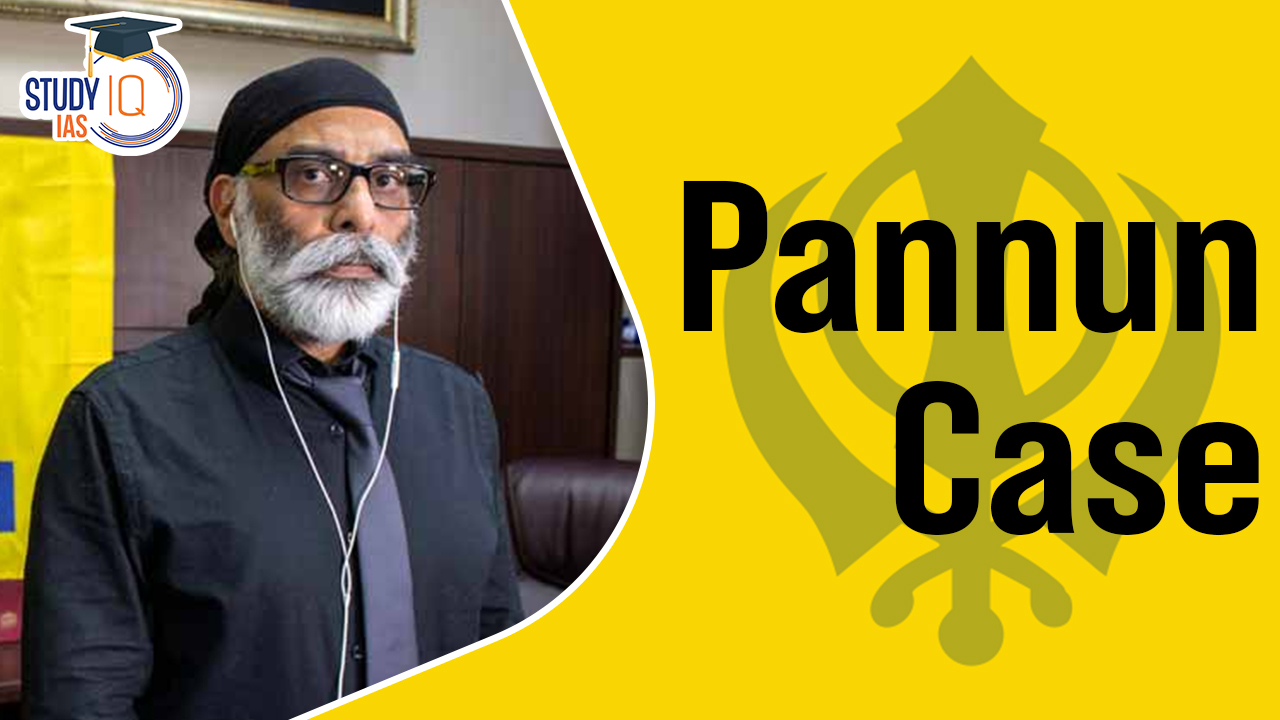Table of Contents
The Pannun case stands at the intersection of international intrigue, diplomatic sensitivity, and the complexities of counterterrorism efforts in the modern era. Centred around Gurpatwant Singh Pannun, a figure synonymous with Khalistani separatism and controversy, this case has captured global attention, sparking debates about sovereignty, free speech, and the delicate balance between national security and individual rights.
Pannun Case
The Pannun Case centres on Gurpatwant Singh Pannun, a controversial figure in India known for his advocacy for Khalistani separatism. Allegations of an assassination plot against Pannun, purportedly involving individuals with ties to the Indian government, have caused tensions between India and the United States. This case underscores the challenges of balancing national security concerns with respect for sovereignty and individual rights, shedding light on the complexities of combating terrorism in today’s world.
Eric Garcetti, the US Ambassador to India, has condemned any involvement in the alleged assassination attempts against Gurpatwant Singh Pannun. Stressing the importance of respecting sovereignty and free speech, he highlighted the need to uphold international norms. The case, which involves accusations of a plot against Pannun, has strained diplomatic relations between India and the United States, revealing the difficulties of cooperation in combating terrorism while maintaining individual rights and bilateral ties.
Pannun Case Background
The Pannun Case stems from the contentious backdrop of Khalistani separatism, with Gurpatwant Singh Pannun emerging as a central figure. Pannun, a dual citizen of the United States and Canada, has long been associated with advocating for an independent Sikh state in Punjab, India. Designated as a terrorist by the Indian government, Pannun’s rhetoric and activities have sparked concerns about destabilizing the region. The case gained prominence with revelations of an alleged assassination plot against Pannun, implicating individuals purportedly linked to the Indian government. This backdrop sets the stage for a complex and sensitive investigation, highlighting the intersection of geopolitics, security, and human rights.
The Alleged Assassination Plot
The case took a dramatic turn with the revelation of an alleged assassination plot against Pannun, orchestrated by individuals purportedly linked to the Indian government. According to the indictment by the US Justice Department, an Indian national named Nikhil Gupta stands accused of being hired by an unidentified Indian government employee to carry out the assassination. However, the attempt was intercepted by US authorities, leading to Gupta’s arrest and subsequent legal proceedings.
Red line should never be crossed’: US Ambassador Garcetti on Pannun case
The alleged involvement of Indian government personnel in the assassination plot has sparked diplomatic repercussions between India and the United States. US Ambassador to India, Eric Garcetti, emphasized the importance of respecting sovereignty and free speech rights while condemning any government’s involvement in such activities as crossing a “red line.” Garcetti’s remarks underscore the delicate balance between addressing security threats and upholding principles of international law and diplomacy.
Protection of Free Speech
The case also raises pertinent questions about the protection of free speech rights, particularly in the context of Pannun’s provocative rhetoric and threats against India. While acknowledging the importance of safeguarding free speech, Ambassador Garcetti emphasized that individuals must be held accountable according to the law, cautioning against the misuse of speech to incite violence or promote unlawful activities.
Bilateral Cooperation
Despite the diplomatic tensions surrounding the case, both India and the United States have demonstrated a commitment to collaborative investigation and justice. India’s proactive steps, including the establishment of an inquiry commission comprising seasoned law enforcement officials, highlight the seriousness with which the matter is being addressed. The joint efforts between the two nations underscore the strength of their bilateral relationship and mutual resolve to combat transnational threats.
Conclusion
The Pannun case represents a complex intersection of diplomacy, security, and human rights, underscoring the challenges inherent in addressing transnational threats within the framework of international law. As investigations continue and legal proceedings unfold, the case serves as a poignant reminder of the importance of upholding principles of sovereignty, free speech, and cooperation in navigating the complexities of modern geopolitics.


 Places in News for UPSC 2025 for Prelims...
Places in News for UPSC 2025 for Prelims...
 List of Indian State Animals with their ...
List of Indian State Animals with their ...
 World Heritage Day 2025, Theme, Objectiv...
World Heritage Day 2025, Theme, Objectiv...





















